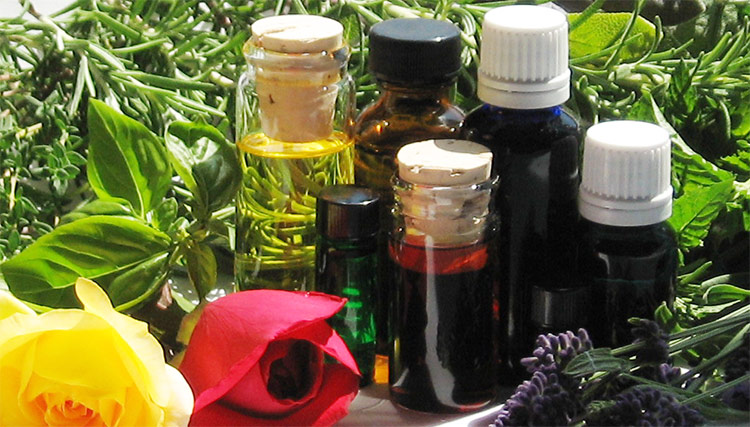What are Essential Oils?

Brief Definition of Essential Oils
Essential oils are highly concentrated, natural plant-based aromatic fluids that offer a wealth of benefits when used safely in aromatherapy, skincare, personal care, spiritual and other wellness and mindfullness applications.
Essential oils, contrary to the use of the word oil, are not really oily-feeling at all. Most essential oils are clear, but some oils such as blue tansy, patchouli, orange and lemongrass are amber, yellow, green or even dark blue in color.
How Essential Oils are Produced
Essential oils are produced by steam or water distillation from the leaves, wood, petals, buds, needles, bark or roots of aromatic botanicals such as lavender, rosemary, cedarwood, rose, peppermint and cypress. While most essential oils are water or hydro distilled, citrus essential oils are either cold pressed or steam distilled from the rinds (peels) of citrus fruits. For more information, please read the The Parts of Plants that Produce Essential Oils article.
Aromatic oils that are not specifically produced by either steam or hydro distillation (or cold pressed in the case of citrus rind oils) are not considered and should not be referred to as essential oils. Refer to the Aromatic Ingredients section of AromaWeb's Article Archive to learn about other aromatic and botanical ingredients and oils that can be used in conjuction with essential oils.
Essential Oil Safety Considerations
Essential oils are highly concentrated, and a little goes a long way. Although they are natural and most smell wonderful, it is important to learn about and respect essential oil safety. Essential oils are highly beneficial and effective when used carefully and with realistic expectations. However, improper use of essential oils can be harmful.
Essential Oils are Not the Same as Perfume Oils or Fragrance Oils
Where essential oils are derived directly from natural botanicals, perfume oils and fragrance oils contain artificial substances and do not offer the therapeutic benefits that essential oils offer. See the What are Fragrance Oils? article for information about fragrance oils and why they are not used in aromatherapy.
An Introduction to the Benefits of Essential Oils
The natural chemical* composition and aroma of essential oils can provide valuable psychological and physical therapeutic benefits. These benefits are usually achieved through methods that include inhalation and topical application of the diluted essential oil to the skin.
*Essential oils are comprised of naturally occurring chemicals. The composition of 100% pure Lavender Essential Oil, for example, includes Linalyl acetate and Linalol. Some individuals who are new to working with essential oils can become confused and frightened when the word chemical is used in conjunction to essential oils. Pure essential oils are not adulterated with additives of any kind. However, pure essential oils are indeed comprised of naturally occurring chemicals, also sometimes referred to as constituents. To learn more about the chemistry of pure essential oils, please refer to the Essential Oil Chemistry section of AromaWeb's Book area.
When left undiluted or not diluted adequately, essential oils can pose a risk of sensitization or irritation when applied topically. When not properly diluted, some can also be phototoxic. Prior to topical application, essential oils are first diluted with a carrier oil such as jojoba, sweet almond oil or apricot kernel oil. See the Carrier Oil Profile section to view more detailed information about carrier oils.
Careful inhalation can also provide therapeutic benefit as the essential oil molecules enter the lungs and are absorbed into the bloodstream. Methods of inhalation include the use of diffusers, inhalers and aromatic jewelry.
Essential Oils are usually sold for individual use in very small bottles. See the Storing Your Oils page for information on how to store your oils and to view pictures of essential oil bottles.
Essential oils can vary greatly in quality and price. Factors that can affect the quality and price of the oil include the rarity of the botanical, the country of origin and growing/climate conditions, quality standards of the distiller, and how much oil is produced by the botanical. For more information, read the Essential Oil Cost and Pricing article.
Essential oils can often be purchased as blends of several essential oils. The advantage to purchasing pre-made essential oils blends is that you can save from having to buy every essential oil individually. When purchasing blends from experienced, reputable essential oil suppliers, you also have the advantage of using blends made by experienced aromatherapists and artisans. The disadvantage is that you have no personal control over the blend by not mixing it yourself nor can you reliably mix the blend with other oils as you could when formulating blends from scratch yourself.
Essential Oil Profiles
For detailed profiles on over 100 oils, visit the Essential Oil Profiles area.
Essential Oil Suppliers
AromaWeb's Aromatherapy Business Directory provides a wonderful categorical directory of sellers of essential oils and aromatherapy products.
The articles within AromaWeb's Essential Oil and Aromatherapy Articles section offer more in-depth information about using essential oils, essential oil safety and holistic aromatherapy. Please also look to AromaWeb's navigational links at the top and bottom of each page to access essential oil profiles, recipes, book descriptions, resources, listings for essential oil businesses and educators and more.

